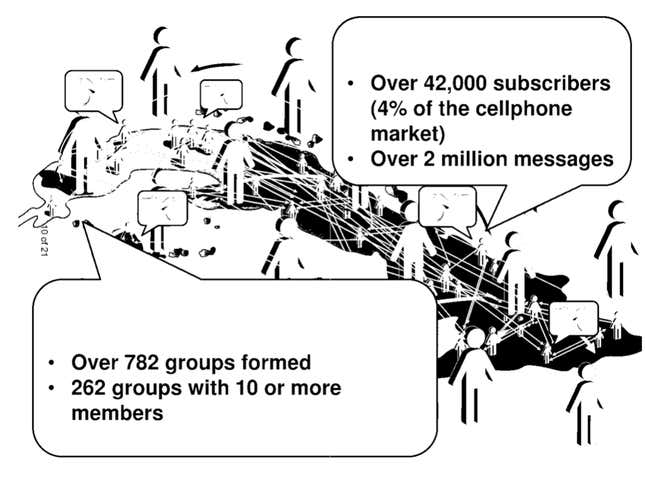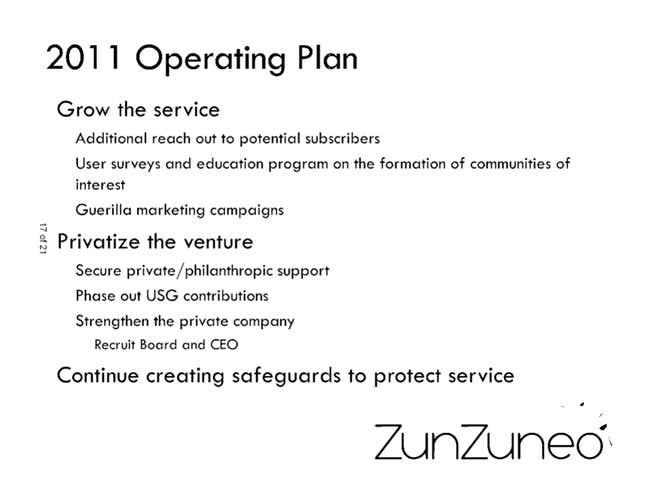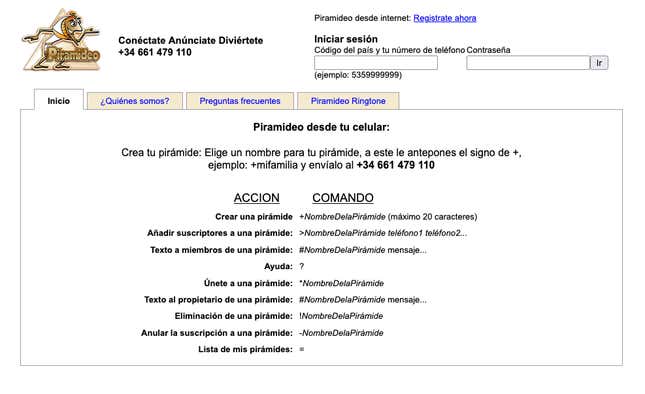
Remember When the U.S. Secretly Built a Social Network to Destabilize Cuba?
The House of Representatives passed a law this week that would force China-based ByteDance to divest from the US version of its popular app TikTok or face a ban in the country. And while the bill’s fate in the Senate remains uncertain, plenty of politicians and members of the U.S. military establishment insist this legislation is all about protecting America’s national security. Few will get too specific about why TikTok threatens national security, but we might find an answer in Cuba, believe it or not.
Why Cuba? The U.S. launched at least two social media networks in the country in an effort to destabilize the Cuban government shortly after Fidel Castro stepped down as president in 2008—precisely the kind of thing U.S. politicians hint could happen here if China has its way.
The most famous tech service launched by the U.S. in Cuba was called ZunZuneo, a play on Cuban slang for a hummingbird’s call, and clearly a nod to Twitter’s bird-based branding. Twitter launched in 2006 but exploded in popularity by 2009, boasting over 58 million users globally. Unfortunately for the people of Cuba, they couldn’t enjoy the social media service, since it was banned in the country, but the U.S. stepped in to fill the void in 2010 with ZunZuneo, which was set up through shell corporations in Spain and the Cayman Islands.
ZunZuneo was decidedly more low-tech than Twitter, but that was largely a product of the technological constraints in Cuban communications infrastructure. Cuba only lifted a ban on cell phones in early 2008 and access to the internet was highly restricted until 2015. ZunZuneo worked by letting users send and receive messages to large groups of people through text messages, a social network design not too different from Twitter in its earliest days.
One way to think of ZunZuneo is like sending a mass text to a dozen of your friends or the parents from your kid’s Little League team and those same people are able to text the group back. It sounds incredibly simple from the vantage point of 2024, but it wasn’t something anyone could do easily in Cuba without a network like ZunZuneo. Even in the U.S., the iPhone only gained the ability to text multiple people in its second year of existence in 2008, at a time when Apple had just 1% of the market.
The existence of ZunZuneo and its ties to the U.S. government only came to the American public’s attention after the Associated Press published a bombshell story in April 2014. It detailed the true goal behind this planned infiltration with information technologies in the Communist country:
ZunZuneo’s organizers wanted the social network to grow slowly to avoid detection by the Cuban government. Eventually, documents and interviews reveal, they hoped the network would reach critical mass so that dissidents could organize “smart mobs” — mass gatherings called at a moment’s notice — that could trigger political demonstrations, or “renegotiate the balance of power between the state and society.”
The Cuban program was happening concurrently with mass protests in Middle Eastern countries in the early 2010s, a regional movement that came to be known as the Arab Spring. Some people believe the U.S. actually orchestrated the Arab Spring in countries like Tunisia and Egypt, though that seems contradicted by the fact that the Obama administration had become extremely cozy with the leaders of those countries and gained nothing strategically or economically from the chaos.
Cuba, on the other hand, was a country where the U.S. didn’t benefit after the Castro-led revolution from 1953-1959, as U.S. business interests were kicked out and America waged a multi-decade campaign to topple Castro, even trying to assassinate him many times. In that kind of environment—where the U.S. had nothing to lose and everything to gain, provided it could just get its foot in the door economically—is where U.S. intel agencies don’t mind a lot of chaos. In fact, government officials under President John F. Kennedy even floated an idea in 1962 of staging false flag terror attacks against Miami and Washington, D.C., and blaming it on Cubans as a pretense to invade the island nation.
ZunZuneo had about 42,000 subscribers in its first year of operation, according to a slide deck released as part of a FOIA request. While that may seem like a humble number, it was apparently a full 4% of the entire cellphone market in Cuba during those early years of mobile phone adoption in the country. The slide deck also noted that over 782 groups had been formed on ZunZuneo, with 262 of those text groups having over 10 people each.

The ZunZuneo effort was led by USAID, a federal agency with a stated mission of helping spread American principles of democracy and free enterprise, but whose more honest mission is to maintain good relations with pliable local governments for the extraction of resources, as well as dependable foreign markets for the sale of American goods. If the U.S. gives rural farmers in Thailand funding or training, those same farmers are more likely to buy John Deere farm equipment. That’s just the way it works. And pointing that out isn’t an attempt to paint the U.S. as uniquely fiendish in its international development efforts. China does exactly the same thing with programs like the Belt and Road Initiative.
While USAID was the lead agency to develop ZunZuneo, it hired two contractors, Mobile Accord and Creative Associates International, to actually build the service. Oddly, Creative Associates had somehow acquired roughly 500,000 Cuban phone numbers through unknown means, according to the AP, which made it a natural choice to win this highly secretive contract.
One of the more fascinating slides from the presentation to USAID that was released through FOIA years later includes a plan to spin off the company as a private venture and phase out U.S. government funding completely. The operating plan for 2011 also noted a desire to grow ZunZuneo’s user base through surveys, educational programs, and guerrilla marketing campaigns.

Whether it was coincidental or not, a real-life spy drama was happening in the background of ZunZuneo’s launch that often gets mentioned in the social media network’s origin story. The program kicked off shortly after the December 2009 arrest of Alan Gross during the presidency of Barack Obama. Gross had been working in Cuba as a communications contractor smuggling computers and satellite phones into the country under the auspices of a contract from USAID but was picked up for allegations of spying for the U.S. government. Gross received a 15-year sentence in Cuba but was released in a prisoner swap in late 2014.
ZunZuneo was shut down in late 2012, though the exact circumstances about why remain unclear. The AP story mentions the Cuban government tried to infiltrate the network, but there are suggestions it may have been shut down because the payment of fees to a Cuban telecom company was putting everything into a dicey space legally, given U.S. sanctions. Ironic, of course.
After ZunZuneo was shut down, but before the existence of the social media network was made public by the AP in 2014, the U.S. government launched a new network called Piramideo, or roughly “pyramid” in English. This effort was more above-board in the sense that it was run through the Broadcasting Board of Governors, America’s largest public-facing media outlet with a mandate to help spread American versions of truth and democracy around the world. Or, to put it more bluntly, the BBG was America’s biggest foreign propaganda arm. A descendant of the Cold War’s USIA, the BBG billed Piramideo as a network that, “makes it easier for people to connect with each other, free from government control.”
Today, visiting the web domain for Piramideo looks like any other desolate internet wasteland of spam. But thanks to the Internet Archive’s Wayback Machine anyone can check out what the site looked like in 2014.

Any Cubans who signed up for a phone tree or “pyramid” with Piramideo could get information about what was happening in the world, free of censorship by the Cuban government. Or at least that was the idea on paper. Critics alleged the service was spreading disinformation with the goal of stirring insurrection against Cuban authorities.
Reese Erlich, an author from Cuba, reported in 2014 about how the service was being used and quoted Nestor Garcia, a former diplomat and teacher at the Institute for International Relations in Havana.
“My students started getting text messages on their cell phones with news reports about demonstrations that never happened,” Garcia is quoted as saying. “The U.S. is trying to create a climate to protest against the Cuban government.”
Piramideo was shut down in 2015 after the AP’s revelations about ZunZuneo were seen as a global embarrassment to American clandestine operations. Despite the embarrassment, the Obama administration successfully started to normalize relations between the U.S. and Cuba in December 2014, which included lifting some travel restrictions and giving American banks some access to the Cuban financial system. President Trump dialed back the Cuban diplomatic thaw, though some political liberalization continued, like when Cuba allowed internet access through mobile phones in 2018.
The U.S. never made it a secret during the Cold War that it wanted to see a liberalization of the Communist government in Cuba. And on the other side of the world, the U.S. pursued a strategic policy with China that opened up the country economically, allowing Beijing to adopt a hybrid model of Communism with plenty of market reforms. So why didn’t that work with Cuba for so many years, from roughly 1960 to 2015? Perhaps because U.S. overtures were almost always underhanded, as though the entire U.S. intel apparatus was running on fumes of spite from the Cuban Missile Crisis.
All of this brings us back to the present day and the top-ranking officials in the U.S. who insist TikTok is a threat to national security. People like FBI Director Christopher Wray have warned that TikTok poses a real threat, pointing his finger at China as the geopolitical enemy who could undermine American values.
“The key point is that the parent company is, for all intents and purposes, beholden to the CCP,” Wray said in congressional testimony earlier this week, using the acronym for the Chinese Communist Party.
Why does it matter if ByteDance is “beholden” to the Chinese government? Defenders of the TikTok ban bill will say TikTok needs to hand over any user data requested by law enforcement in China under an opaque system. Or they’ll point out that whoever controls the TikTok algorithm can tweak it to show American users conspiracy theories, just as Sen. Marco Rubio, a Republican from Florida, claimed in his questioning of the FBI director this week.
“And if (the Chinese Communist Party) said, ‘We want you to put out videos that make Americans fight with each other or spread conspiracy theories and get them at each other’s throat,’ ByteDance can’t go to Chinese court and fight the Communist Party, they would have to do it?” Rubio asked.
“That’s my understanding,” Wray responded. “And I would just add, that kind of influence operation, or the different kinds of influence operations you’re describing, are extraordinarily difficult to detect, which is part of what makes the national security concerns represented by TikTok so significant.”
But the reason Wray knows those influence operations are difficult to detect is that the U.S. has regularly engaged in them—whether it was the 1950s when the USIA was creating fake journalists to plant fake news in newspapers around the world or the more recent examples in Cuba from just a decade ago.
Many of the rationales for banning TikTok aren’t very satisfying when you recall the U.S. does practically all the same things, like establishing a legal shield for agencies like the FBI to request data on American citizens through secret national security letters that nobody’s allowed to talk about. There’s also the troubling fact that U.S.-owned social media companies were built on the same formulas that reward extreme emotions like fear, sadness, and outrage. How many stories have you heard of people who’ve become estranged from family members after they fell into a pit of conspiracy theories on Facebook or Twitter? Does it really matter if the person making money by sowing this kind of discontent is sitting in China or the U.S.?
The TiKTok bill still needs to pass in the U.S. Senate, something that may or may not happen in the near future. If the general attitude coming down from Capitol Hill is any indication, senators may just ignore this bill and let it die a slow death on the vine, especially with Trump making a complete reversal recently.
Whatever your thoughts on the TikTok ban specifically, there’s absolutely no doubt that the New Cold War will continue to be fought online with countries like the U.S. and China spending millions to make it happen. Let’s just cross our fingers that whatever this is doesn’t turn into a shooting war. With the benefit of hindsight, it’s honestly a miracle we lived through the first Cold War without nuclear armageddon.
